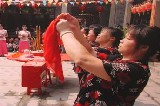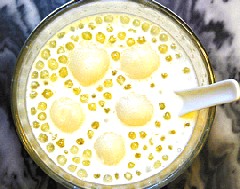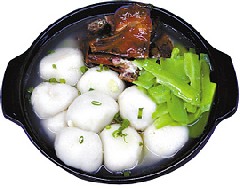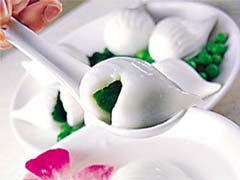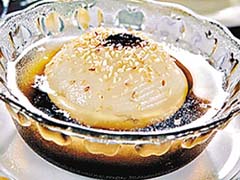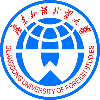Guangzhou Major Events & Festivals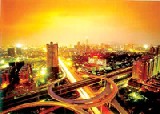 Much of the festivals in Guangzhou, China are born out of
either the beliefs of the people or due to the age old folk
customs. These customs have been passed from one generation
to other and are celebrated on large scale over a couple of
days. However with the changing times, new customs have been
added which have given the Festivals and Events in Guangzhou
a new look. Much of the festivals in Guangzhou, China are born out of
either the beliefs of the people or due to the age old folk
customs. These customs have been passed from one generation
to other and are celebrated on large scale over a couple of
days. However with the changing times, new customs have been
added which have given the Festivals and Events in Guangzhou
a new look.
The various festivals and events that occupy a major portion of the calendar fulfill some social needs and duties other than with the aim of providing entertainment. It's the perfect time for all to get together and take a break from their busy schedule. These are the time of celebrations which are cherished by all. The festivals and events help in bringing the religious, geographical and social groups together and bind them in a single entity. Since much of the Festivals and Events in Guangzhou focus on ancient customs, their celebrations are intended to teach the younger generation their value. The times of celebration are marked with enormous preparations. Everyone seems to be happy and is keen to take part in the minutest of preparations. The festivals held in Guangzhou are either seasonal or annual. They vary in their respective cause as some have a cultural significance while the importance of some is purely religious. The festive time really keeps the people busy with a lot of house hold chores. New clothes are purchased, gifts are exchanged, houses are given a fresh coat of painting and temples are visited in large numbers by devotees to seek the blessings of their worshipped deity for a prosperous life. Apart from the rituals that are followed, most of the festivals are accompanied by songs and dance. The festivals and events usually come along with elaborate fairs. The Festivals and Events of Guangzhou are colorful and are an integral part of the cultural life of the people of the city.
Chinese New Year in Guangzhou is celebrated among much joy and is very close to everyone's heart. This nationwide festival is celebrated in the first day of the lunar calendar and usually lasts for a couple of days marked by a number of fun events, entertainment and family and friends gatherings. The festival is also known as the Spring Festival. Other events of the festival comprise of traditional and customary
Chinese dances like lion dancing. The age old Yangge Dancing
is also performed as a part of the religious side of the festival
and is meant to ward off evil spirits. As a way to prepare
for the festival, houses are cleaned and purified. The common
people also get new clothes for themselves and decorate their
houses with red lanterns.
The Guangzhou Trade Fair, or the Canton Fair as it is often
called, is the most popular event which is held twice annually.
The Trade Fair in Guangzhou has been organized since the 1950s
and it is the main foreign trade institution in China.
The Winter Solstice in Guangzhou is celebrated with great tempo, enthusiasm, and spirit. The Winter Solstice or Dong Zhi is generally celebrated on the 21st, 22nd or 23rd of the twelfth month in Chinese lunar calendar. In fact, most of the people in Guangzhou, celebrate this day as an occasion for family reunion. It is believed that with the Winter Solstice, the period of chilling cold continuing for 81 days, come to an end. Traditionally, a family will feast themselves with lavish dishes during this time. On the Winter Solstice, you must enjoy hot soup with flour dumplings - the most important item of the celebration. The excitement of the Chinese on this day will necessarily remind you of the Chinese proverb meaning 'Winter solstice is more important than new year's day'. In Guangzhou, you will find locals going to supermarkets, restaurants and department stores for marketing just before the festival. You will find plenty of people gulping down mutton, chicken, dumplings and glutinous rice balls during this festival. You will also notice that the Hotpot restaurants in the city are too crowded during this time.
The Qi Qiao Festival, also called the Double Seventh Festival,
is cerebrated on the 7th day of the 7th month of the Chinese
lunar calendar. This Chinese Valentine's Day is a festival
of romance. Qi Qiao is considered a big event in Guangdong.
There have been special cerebrations for the festival ever
since the Ming and Qing Dynasties (from about 1368 to 1840)
in Guangzhou's Zhu village. However, all the celebrations
ceased as a result of war, among other reasons, but were revived
by senior villagers in the village in 1998.
Bai Xian
In traditional Chinese belief, death does not mean a person
stops existing. Rather, it means that he or she goes to live
in another world. Paying respects to the ancestors' tombs
is considered a rare, solemn occasion when people of two worlds
can meet and communicate.
The Spring Festival is closely followed by the Yuanxiao Festival
(Lantern Festival) also known as Chinese Valentine's Day.
The Yuanxiao Festival is on the 15th day of the first month
of the lunar calendar and the day is always accompanied by
coloured lights, riddles, lanterns and Tang Yuan (glutinous
rice dumpling).
Guangzhou also has a mysterious long-standing temple fair
called the Polo Temple Fair. It is said that the lunar calendar
from February 11 to 13 of every year is the birthday of the
Sea God (Polo Birth). During the Polo Birth every family of
the near 15 townships all makes glutinous rice dumplings to
celebrate the Polo Temple Fair as well as parade to various
townships to communicate with each other, and worship in the
temple. Various places will build "the tribute awning",
where there exhibits three domestic animals, seafood, pastry,
candy, food and drink so as to offer a sacrifice to the Bodhisattva.
The joyous Mid-Autumn Festival was celebrated on the fifteenth day of the eighth lunar month, around the time of the autumn equinox. This day is also considered as the harvest festival since fruits, vegetables and grain will have been harvested by this time and food will be abundant. With delinquent accounts settled prior to the festival, it was a time for relaxation and celebration. Food offerings are given generally placed in the courtyard. Apples, pears, peaches, grapes, pomegranates, melon, oranges and pommels may also be given. Other special foods for the festival include moon cakes, cooked taro, edible snails from the taro patches or rice paddies cooked with sweet basils, and water chestnut resembling black buffalo horns. During this festival, huge lantern will be displayed in Wenhua Park (Culture Park) in Guangzhou, attracting many local citizens and foreign visitors. Thousands of differently shaped lanterns are lit, forming a fantastic contrast with the bright moonlight. Because the full moon is round and symbolizes reunion, the Mid-Autumn Festival is also known as the festival of reunion. All family members try to get together on this special day. Today, festivities centered about the Mid-Autumn Festival are more varied. After a family reunion dinner, many people like to go out to attend special performances in parks or on public squares.
The Chongyang Festival falls on the ninth day of the ninth
month of the Chinese lunar calendar, also known as the Double
Ninth Festival.
When the Duanwu Festival (Dragon Boat Festival) approaches, Guangzhou citizens begin to visit their relatives and friends by dragon boats. |

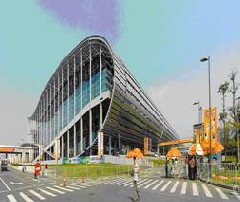
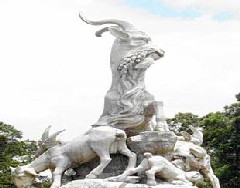
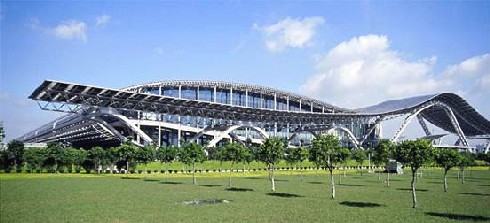
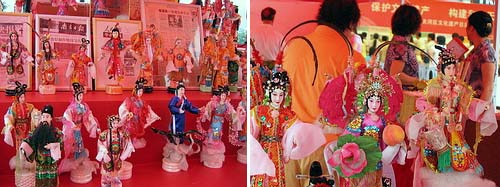
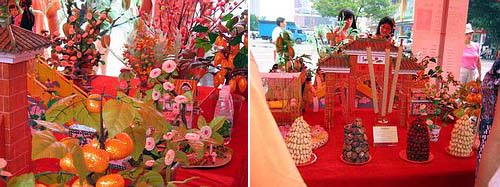
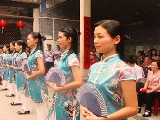 Qi Qiao
Qi Qiao